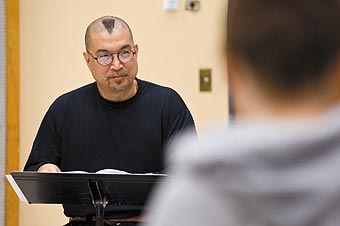Visiting artist’s journey of collaboration, imagination
Fred Ho, master of the baritone saxophone, composer, writer, producer, activist, visionary and leader of the Afro Asian Music Ensemble, is this semester’s Arts Institute artist in residence. He has innovated a new form of American multicultural music with influences from Asia, Africa and the Pacific Rim, a reflection of his commitment to political, social and personal transformation.

Fred Ho, visiting artist this semester at the Arts Institute, directs students on costume design and selection during a classroom session of his Afro-Asian Multidisciplinary Performance Workshop: Revolutionary Sound and Word.
Photo: Bryce Richter
Ho is also a prolific writer and scholar. He is co-editor with Ron Sakolsky of “Sounding Off! Music as Subversion / Resistance / Revolution,” which won the 1996 American Book Award, and was lead editor of “Legacy to Liberation: Politics and Culture of Revolutionary Asian/Pacific America.” His “Wicked Theory Naked Practice” is forthcoming, and his co-edited anthology with Bill Mullen, “Afro Asia: Revolutionary Political and Cultural Connections between African Americans and Asian Americans,” has just been published.
The students in his class, Afro-Asian Multidisciplinary Performance Workshop: Revolutionary Sound and Word, have embarked on a creative journey of collaboration and imagination. The 10 undergraduates sound like an unlikely cohort for a cutting-edge creative endeavor. Majors represented include veterinary science, reliogous studies, art history, theater, literature, biology and Afro-American studies. Under Ho’s guidance, though, they are challenging themselves and each other to explore possibilities that would test artists with more life experience.
Ho will present “Revolutionary Earth Music and Performance: People and the Planet Before Profit!” at 7:30 p.m. on Saturday, Nov. 22, at the Wisconsin Union Theater. The evening will include a performance by Ho’s New York-based Afro Asian Music Ensemble, a new work by Ho’s UW–Madison students and a collaborative work with Peggy Choy from the Dance Program. The event is free and open to the public.
Ho provided Wisconsin Week some insights on the class and the transformative power of art.
WW: How has class been going?
Ho: I think wonderfully. It’s been a huge challenge to myself and the students, in the sense that I didn’t have anything predetermined and set. The only criteria I had during the auditions was that the students be open and have potential. They’re learning that through risk-taking there are rewards. The process and product are inextricable.
When you create new work you can’t have things all planned, especially when you’re creating with people you’ve never met before. That’s why I used the word “revolutionary” in the course title. I don’t want them to just regurgitate, revise, rework and redo what has been done. I want them to create a new piece based on a vision of the future in how they see themselves and in relation to society.
We’ve been taking that work to new external and internal places. It comes with struggle, but it’s good. People have to be open and explore, expand, and embark into new territory in their emotional, intellectual and expressive levels.
WW: What are the students preparing?
Ho: It’s still being developed and created. It’s a suite with 10 movements, some are solo, some are group works. I’d describe it as contemporary opera but it’s way beyond traditional opera. It’s more of from the point of view of an epic journey of emotion, ideas and expressivity. It’s not necessarily linear and narrative, but it has those elements. We’re still building it. It’s unpredictable, just as life is unpredictable. I didn’t come with a project all done for them to mimic. This is about their journeys. The process has been revolutionary.
WW: What do you hope the students will learn and experience?
Ho: I want them to be revolutionaries. I want them to create a new society predicated on the values of collaboration, acceptance, struggle, diversity, discourse and transformation. I hope they become fearless and bold; not accepting the status quo to be a cog in the machine; do more than just get by.
These students will be incredible forces in the world and not because of anything I’ve done. They may not be the best musicians, dancers, writers and performers, but they are the most imaginative. There’s a potential in them that made them want to come to this course called Afro-Asian Multidisciplinary Performance Workshop: Revolutionary Sound and Word. No matter what they’re studying here, the class can be useful and relevant. Creativity is of equal importance to whatever professional and personal goals they’re trying to reach.
I try to teach them to think beyond the performance — what’s next is what I want them to consider. One of my assignments to the students is to consider: Why was I put on this planet? What is my mission? Am I who I am? Am I all that I ought to be?
Nothing is static, it’s about going to a place of possibility that you never planned or predicted, but it should be a better place that expands your capacity for empathy, generosity, compassion and social responsibility. It’s a lifelong process of understanding your life.




